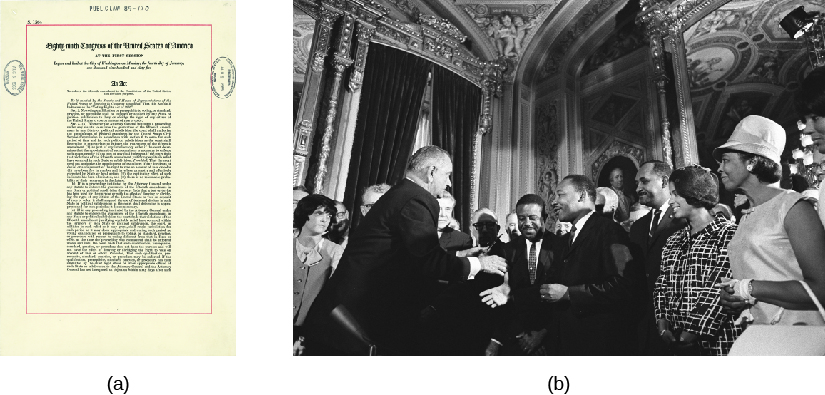| << Chapter < Page | Chapter >> Page > |

The effects of the VRA were visible almost immediately. In Mississippi, only 6.7 percent of blacks were registered to vote in 1965; however, by the fall of 1967, nearly 60 percent were registered. Alabama experienced similar effects, with African American registration increasing from 19.3 percent to 51.6 percent. Voter turnout across these two states similarly increased. Mississippi went from 33.9 percent turnout to 53.2 percent, while Alabama increased from 35.9 percent to 52.7 percent between the 1964 and 1968 presidential elections.
Following the implementation of the VRA, many states have sought other methods of increasing voter registration. Several states make registering to vote relatively easy for citizens who have government documentation. Oregon has few requirements for registering and registers many of its voters automatically. North Dakota has no registration at all. In 2002, Arizona was the first state to offer online voter registration, which allowed citizens with a driver’s license to register to vote without any paper application or signature. The system matches the information on the application to information stored at the Department of Motor Vehicles, to ensure each citizen is registering to vote in the right precinct. Citizens without a driver’s license still need to file a paper application. More than eighteen states have moved to online registration or passed laws to begin doing so. The National Conference of State Legislatures estimates, however, that adopting an online voter registration system can initially cost a state between $250,000 and $750,000.
Other states have decided against online registration due to concerns about voter fraud and security. Legislators also argue that online registration makes it difficult to ensure that only citizens are registering and that they are registering in the correct precincts. As technology continues to update other areas of state recordkeeping, online registration may become easier and safer. In some areas, citizens have pressured the states and pushed the process along. A bill to move registration online in Florida stalled for over a year in the legislature, based on security concerns. With strong citizen support, however, it was passed and signed in 2015, despite the governor’s lingering concerns. In other states, such as Texas, both the government and citizens are concerned about identity fraud, so traditional paper registration is still preferred.
The
National Commission on Voting Rights completed a study in September 2015 that found state registration laws can either raise or reduce voter turnout rates, especially among citizens who are young or whose income falls below the poverty line. States with simple voter registration had more registered citizens.

Notification Switch
Would you like to follow the 'American government' conversation and receive update notifications?